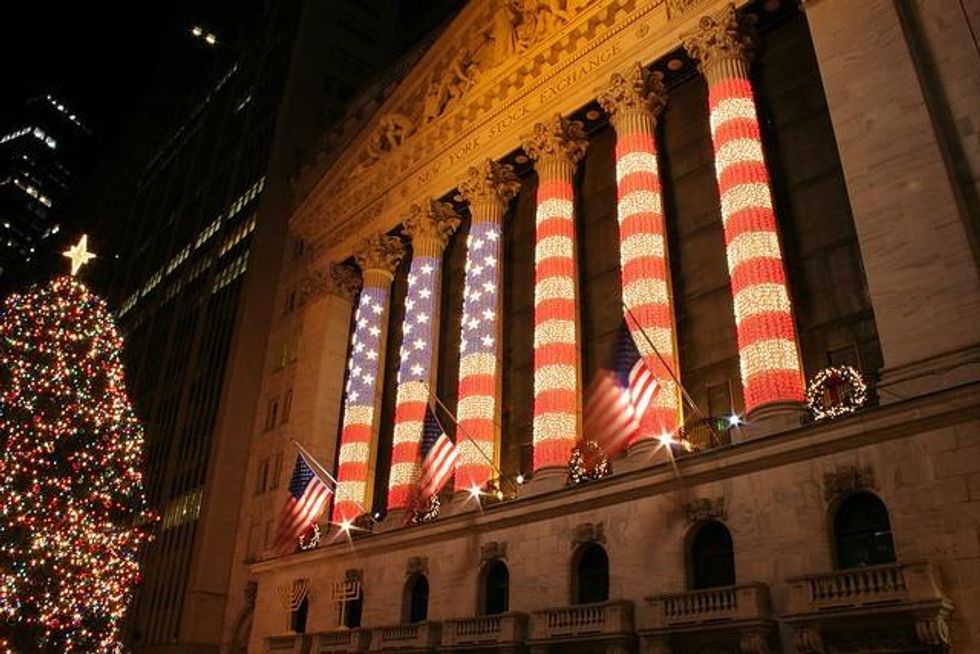Wall Street Sings While Americans Sob: Happy New Year One and All
Wall Street posts record gains as millions of Americans face a year of more cuts

"Never, I don't think, in recent history have you had unemployment this chronically high for so long with the market having done this well," Roben Farzad, an economics writer and contributor to Bloomberg's Businessweek, said on PBS Newshour Tuesday.
"There's a stat that Obama's bull market just beat Ronald Reagan's. I dare say, if you canvass the man on the street, no one would guess that we beat the decade of decadence already. You're certainly not feeling it out there," he continued.
At the end of the day Tuesday, the Standard & Poor index closed with a nearly 30 percent gain, its best since 1997. The Dow Jones Industrial Average also closed at a record high, reaching 16,576.73, up 26.5 percent on the year--marking the largest annual jump since 1996.
And, according to the Wall Street Journal, when dividends are taken into account, stocks posted their best returns since 1995.
However, for the half of Americans who avoid or cannot afford to dally in the stock market, these gains are inconsequential. With the unemployment rate currently near 7 percent, it's clear that many of these corporate gains have not had any positive impact on working people.
As corporate profits after taxes have grown 30 percent since 2007 and the number of jobs is still below its pre-recession level, Farzad asks: "At what point do you see companies feeling so flush, so hale that they see their stock prices and market capitalizations up that they have to go out and hire?"
As Huffington Post reporter Mark Gongloff points out, "corporate profits are soaring largely because companies have been squeezing costs--especially labor costs."
With a scant rise of just 2.1 percent, hourly wages have "barely budged since the market bottomed in 2009," Gongloff reports, "while the Dow has skyrocketed 153 percent."
And for the "man on the street," the New Year will bring changes of another measure.
On Saturday, emergency federal unemployment benefits were allowed to expire for 1.3 million people who have been unemployed more than six months.
"These are precisely the jobless who will suffer most from a cutoff, since they have been scraping by on unemployment checks for so long that their financial situations are already precarious, if not dire," writes Washington Post columnist Eugene Robinson.
Compounding these "dire" financial straits, 2013 also saw the gutting of essential social safety nets.
In November, food stamp benefits were slashed for an estimated 48 million people, including 22 million children, by an average of 7%.
As The Guardian's Karen McVeigh reported last week:
As these cuts begin to bite, even harsher reductions are in prospect. Republicans in the House of Representatives have proposed $38bn cuts over 10 years, in their latest version of a long-delayed farm bill that would also require new work requirements and drug tests for food stamp recipients.
_____________________
An Urgent Message From Our Co-Founder
Dear Common Dreams reader, The U.S. is on a fast track to authoritarianism like nothing I've ever seen. Meanwhile, corporate news outlets are utterly capitulating to Trump, twisting their coverage to avoid drawing his ire while lining up to stuff cash in his pockets. That's why I believe that Common Dreams is doing the best and most consequential reporting that we've ever done. Our small but mighty team is a progressive reporting powerhouse, covering the news every day that the corporate media never will. Our mission has always been simple: To inform. To inspire. And to ignite change for the common good. Now here's the key piece that I want all our readers to understand: None of this would be possible without your financial support. That's not just some fundraising cliche. It's the absolute and literal truth. We don't accept corporate advertising and never will. We don't have a paywall because we don't think people should be blocked from critical news based on their ability to pay. Everything we do is funded by the donations of readers like you. Will you donate now to help power the nonprofit, independent reporting of Common Dreams? Thank you for being a vital member of our community. Together, we can keep independent journalism alive when it’s needed most. - Craig Brown, Co-founder |

"Never, I don't think, in recent history have you had unemployment this chronically high for so long with the market having done this well," Roben Farzad, an economics writer and contributor to Bloomberg's Businessweek, said on PBS Newshour Tuesday.
"There's a stat that Obama's bull market just beat Ronald Reagan's. I dare say, if you canvass the man on the street, no one would guess that we beat the decade of decadence already. You're certainly not feeling it out there," he continued.
At the end of the day Tuesday, the Standard & Poor index closed with a nearly 30 percent gain, its best since 1997. The Dow Jones Industrial Average also closed at a record high, reaching 16,576.73, up 26.5 percent on the year--marking the largest annual jump since 1996.
And, according to the Wall Street Journal, when dividends are taken into account, stocks posted their best returns since 1995.
However, for the half of Americans who avoid or cannot afford to dally in the stock market, these gains are inconsequential. With the unemployment rate currently near 7 percent, it's clear that many of these corporate gains have not had any positive impact on working people.
As corporate profits after taxes have grown 30 percent since 2007 and the number of jobs is still below its pre-recession level, Farzad asks: "At what point do you see companies feeling so flush, so hale that they see their stock prices and market capitalizations up that they have to go out and hire?"
As Huffington Post reporter Mark Gongloff points out, "corporate profits are soaring largely because companies have been squeezing costs--especially labor costs."
With a scant rise of just 2.1 percent, hourly wages have "barely budged since the market bottomed in 2009," Gongloff reports, "while the Dow has skyrocketed 153 percent."
And for the "man on the street," the New Year will bring changes of another measure.
On Saturday, emergency federal unemployment benefits were allowed to expire for 1.3 million people who have been unemployed more than six months.
"These are precisely the jobless who will suffer most from a cutoff, since they have been scraping by on unemployment checks for so long that their financial situations are already precarious, if not dire," writes Washington Post columnist Eugene Robinson.
Compounding these "dire" financial straits, 2013 also saw the gutting of essential social safety nets.
In November, food stamp benefits were slashed for an estimated 48 million people, including 22 million children, by an average of 7%.
As The Guardian's Karen McVeigh reported last week:
As these cuts begin to bite, even harsher reductions are in prospect. Republicans in the House of Representatives have proposed $38bn cuts over 10 years, in their latest version of a long-delayed farm bill that would also require new work requirements and drug tests for food stamp recipients.
_____________________

"Never, I don't think, in recent history have you had unemployment this chronically high for so long with the market having done this well," Roben Farzad, an economics writer and contributor to Bloomberg's Businessweek, said on PBS Newshour Tuesday.
"There's a stat that Obama's bull market just beat Ronald Reagan's. I dare say, if you canvass the man on the street, no one would guess that we beat the decade of decadence already. You're certainly not feeling it out there," he continued.
At the end of the day Tuesday, the Standard & Poor index closed with a nearly 30 percent gain, its best since 1997. The Dow Jones Industrial Average also closed at a record high, reaching 16,576.73, up 26.5 percent on the year--marking the largest annual jump since 1996.
And, according to the Wall Street Journal, when dividends are taken into account, stocks posted their best returns since 1995.
However, for the half of Americans who avoid or cannot afford to dally in the stock market, these gains are inconsequential. With the unemployment rate currently near 7 percent, it's clear that many of these corporate gains have not had any positive impact on working people.
As corporate profits after taxes have grown 30 percent since 2007 and the number of jobs is still below its pre-recession level, Farzad asks: "At what point do you see companies feeling so flush, so hale that they see their stock prices and market capitalizations up that they have to go out and hire?"
As Huffington Post reporter Mark Gongloff points out, "corporate profits are soaring largely because companies have been squeezing costs--especially labor costs."
With a scant rise of just 2.1 percent, hourly wages have "barely budged since the market bottomed in 2009," Gongloff reports, "while the Dow has skyrocketed 153 percent."
And for the "man on the street," the New Year will bring changes of another measure.
On Saturday, emergency federal unemployment benefits were allowed to expire for 1.3 million people who have been unemployed more than six months.
"These are precisely the jobless who will suffer most from a cutoff, since they have been scraping by on unemployment checks for so long that their financial situations are already precarious, if not dire," writes Washington Post columnist Eugene Robinson.
Compounding these "dire" financial straits, 2013 also saw the gutting of essential social safety nets.
In November, food stamp benefits were slashed for an estimated 48 million people, including 22 million children, by an average of 7%.
As The Guardian's Karen McVeigh reported last week:
As these cuts begin to bite, even harsher reductions are in prospect. Republicans in the House of Representatives have proposed $38bn cuts over 10 years, in their latest version of a long-delayed farm bill that would also require new work requirements and drug tests for food stamp recipients.
_____________________

